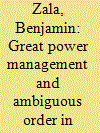| Srl | Item |
| 1 |
ID:
151644


|
|
|
|
|
| Summary/Abstract |
This article considers what the nineteenth century can tell us about the nature of great power management under conditions of ambiguity in relation to the holders of great power status. It charts the development of an institutionalised role for the great powers as managers of international society but with a specific focus on the mutual recognition, and conferral, of status. Such a focus highlights the changing, and sometimes competing, perceptions of not only which states should be thought of as great powers, but also therefore whether the power structure of international society remained multipolar or shifted towards bipolarity or even unipolarity. The article argues that a ‘golden age’ of great power management existed during a period in which perceptions of great power status were in fact more fluid than the standard literature accounts for. This means that predictions surrounding the imminent demise of the social institution of great power management under an increasingly ambiguous interstate order today may well be misplaced.
|
|
|
|
|
|
|
|
|
|
|
|
|
|
|
|
| 2 |
ID:
145549


|
|
|
|
|
| Summary/Abstract |
This article is a contribution to the English School’s theory of primary institutions. It offers an historical and structural enquiry into the meaning of great power management (GPM) as a primary institution of international society as it has evolved since the 18th century. We seek to uncover the driving forces that shape this primary institution, and how they are redefining its legitimacy in the 21st century. We are particularly interested in uncovering whether and how particular conditions in international systems/societies facilitate or obstruct the operation of GPM. The article examines how system structures, both material and ideational, have set different conditions for GPM. Using the evolution from traditional to non-traditional security as a template, it sets out the main functions that have evolved for GPM. It shows how the institution has different meanings and roles at different times, and how they play into the legitimacy that GPM requires. It considers how GPM works at both regional and global levels, and concludes by looking ahead at the prospects for GPM, and opening a discussion on how to relate GPM to global governance.
|
|
|
|
|
|
|
|
|
|
|
|
|
|
|
|